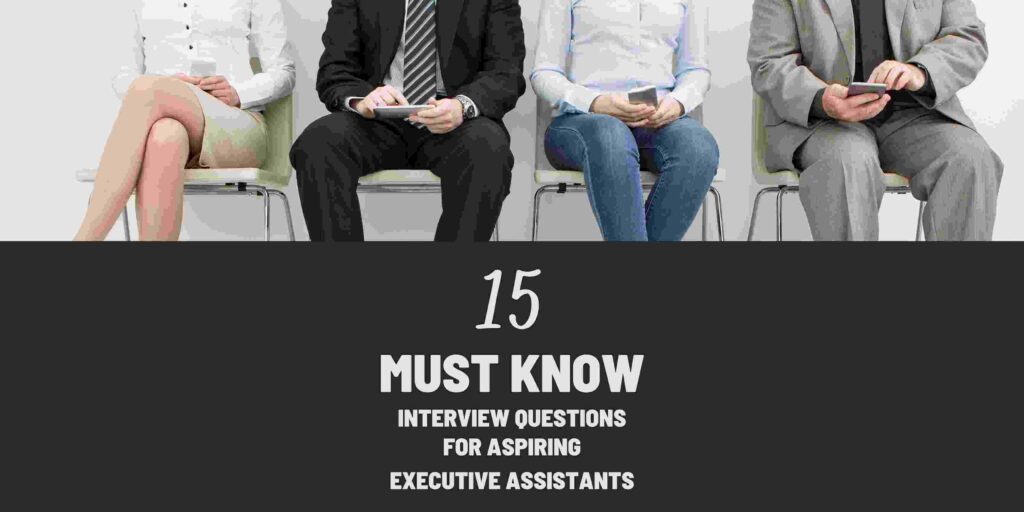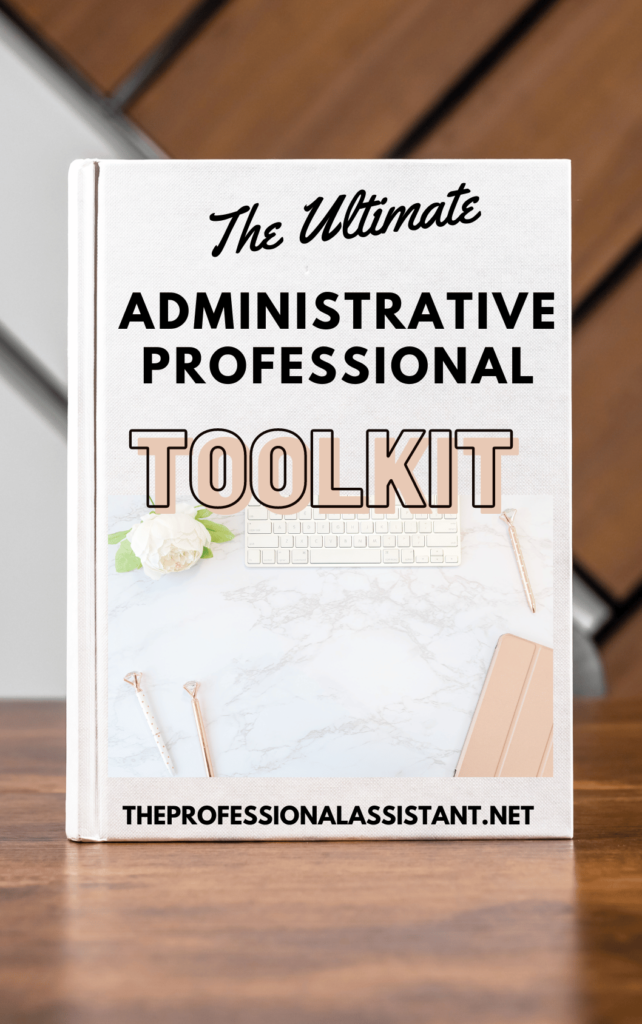Executive Assistant Interview Questions (With Bonus Answers!)

Hey there, future executive assistants! Are you ready to trade in your multi-tasking superhero cape for an even shinier one? Well, buckle up, because we’re diving into the thrilling world of executive assistant interview questions! These aren’t just any questions; they’re the top 15 brain-teasers that hiring managers love to toss your way faster than you can say ‘calendar management’. But fear not! Along with each question, I’m serving up not one, but two sample answers, hotter than your morning coffee. So, whether you’re a seasoned administrative assistant or just starting to climb the corporate ladder, this guide has got you covered. Let’s transform those nervous jitters into confident struts as you march into your next interview. Ready? Set? Let’s roll!”
For each question make sure to highlight relevant experiences and skills, especially those demonstrating your competence and readiness for an Executive Assistant role. Here are two example answers for each question:
Executive Assistant Interview Questions
1. Can you describe your experience as an Administrative Assistant and how it has prepared you for an Executive Assistant role?
– “In my current role as an Administrative Assistant, I have developed strong organizational and time management skills by managing calendars, coordinating meetings, and handling travel arrangements. This experience has prepared me for the more complex scheduling and coordination required in an Executive Assistant role.”
– “I’ve honed my communication and problem-solving abilities while serving as a liaison between department heads and staff. This has given me valuable insights into handling high-level communication and discreetly managing sensitive information, which are crucial skills for an Executive Assistant.”
2. How do you manage and prioritize the schedule of a busy executive?
– “I prioritize tasks based on urgency and importance. For example, I ensure that critical meetings are scheduled without conflicts, and I keep buffer times for unexpected tasks or emergencies that might arise.”
– “I regularly communicate with the executive to understand their priorities. In one instance, I rearranged their schedule to accommodate an urgent meeting, ensuring that less critical appointments were rescheduled promptly and efficiently.”
3. Can you give an example of a time when you had to handle confidential information?
– “I have always maintained the utmost discretion when handling sensitive information. For instance, when managing confidential client contracts, I ensured that documents were securely stored and only shared with authorized personnel.”
– “I once handled a sensitive HR issue, keeping the details confidential as per company policy. This involved discreet coordination between HR and the executive to resolve the matter without breaching confidentiality.”
4. Describe a complex project you managed. What was your approach, and what was the outcome?
– “I led the organization of an annual conference, coordinating with multiple vendors, managing budgets, and overseeing the itinerary. The event was successful, with positive feedback from both the executive team and attendees.”
– “I managed a transition to a new digital filing system. This required meticulous planning, training staff, and ensuring a smooth transition. The project improved our office’s efficiency and reduced paper waste.”
5. How do you handle situations where you have to make decisions on behalf of your executive?
– “I make informed decisions based on my understanding of the executive’s preferences and the company’s policies. For example, I have handled the approval of routine office expenses when the executive was unavailable, ensuring business continuity.”
– “I once had to decide on a venue for an urgent meeting in the executive’s absence. I chose a location that was convenient for all attendees and well-equipped for our needs, which the executive later commended.”
6. What strategies do you use to ensure effective communication between the executive and other staff members?
– “I maintain an open line of communication, regularly updating staff on the executive’s decisions and feedback. I also encourage them to bring any concerns or ideas to my attention, which I then communicate to the executive.”
– “I facilitate weekly catch-up meetings between the executive and department heads to ensure alignment on projects and initiatives, improving overall communication and efficiency.”
7. How do you handle a situation where your executive is unavailable and an urgent decision needs to be made?
– “In cases where immediate decisions are required, I rely on my knowledge of the executive’s priorities and the company’s objectives to make the best possible decision. For example, I once had to reschedule meetings due to an unexpected executive emergency, prioritizing based on importance and urgency.”
– “I assess the situation, gather all necessary information, and if possible, consult with senior team members before making a decision. This approach helped me successfully handle a last-minute change in a major presentation.”
8. Describe a time when you had to adapt to a significant change in the workplace. How did you manage it?
– “When our company underwent a merger, I quickly adapted to the new organizational structure and systems. I took the initiative to learn the new processes and helped my team transition smoothly.”
– “During a major office relocation, I managed the shift effectively by planning ahead, coordinating with various departments, and ensuring minimal disruption to our executive’s schedule and office operations.”
9. What tools and software are you proficient in, and how have you used them to support an executive’s work?
– “I am proficient in Microsoft Office Suite, particularly in Outlook for email management and calendar scheduling, and PowerPoint for creating high-quality presentations. These tools have been essential in supporting my executive’s day-to-day activities.”
– “I regularly use project management software like ClickUp! to track progress on various projects and ensure that deadlines are met. This has significantly improved our team’s efficiency and accountability.”
| 🌟This is the perfect place to showcase your software skills.🌟
💻 Check out the 11 Essential Software Tools for Administrative Professionals here💻 |
10. How do you ensure that you meet deadlines when you have multiple tasks or projects?
– “I create a prioritized task list and set realistic deadlines. For instance, I once coordinated a project deadline with ongoing daily tasks by breaking down the project into smaller tasks and delegating when appropriate.”
– “I use digital tools like task management software to keep track of all tasks and their deadlines. This approach helped me successfully manage simultaneous preparations for a board meeting and an employee engagement event.”
11. Can you provide an example of how you have improved processes or systems to increase efficiency in your current role?
– “I introduced a digital filing system that replaced our outdated paper files. This not only saved time but also made document retrieval more efficient and secure.”
– “I streamlined the travel booking process by implementing a centralized booking system. This reduced costs and saved time, making the process more efficient for both the executive and the staff.”
12. How do you handle stress and pressure, especially when managing critical tasks for your executive?
– “I stay organized and focus on one task at a time. During a particularly high-pressure period, I successfully coordinated an overseas visit for the executive by methodically tackling each element of the trip.”
– “I manage stress by maintaining a healthy work-life balance and practicing mindfulness. This approach helped me stay calm and focused during our office’s busiest quarter, ensuring that I effectively supported the executive’s needs.”
13. What do you think are the most important qualities of an effective Executive Assistant?
– “Key qualities include strong organizational skills, excellent communication, discretion, and the ability to anticipate needs. For example, by anticipating potential schedule conflicts, I have proactively managed the executive’s calendar to avoid issues.”
– “An effective Executive Assistant should be adaptable, resourceful, and have strong problem-solving skills. I demonstrated these when I quickly adapted to remote work during the pandemic, ensuring seamless support for my executive.”
14. Have you ever had a disagreement with an executive? How did you handle it?
– “When I disagreed with an executive’s approach to a project, I respectfully presented my concerns and alternative solutions. This open dialogue led to a more effective project strategy.”
– “If I have a different perspective, I discuss it with the executive calmly and professionally, backing up my points with data or examples. This approach was effective when we were deciding on a new office vendor, leading to a better-informed decision.”
15. What motivates you in an Executive Assistant role?
– “I am motivated by the opportunity to contribute to the success of the executive and the organization. For instance, efficiently managing an executive’s schedule to allow them more time for strategic decisions is particularly rewarding.”
– “I thrive on the variety of tasks and the need to constantly adapt and learn. Being in a role where I can use my skills to facilitate smooth operations and support high-level decision-making is very fulfilling.”
Remember, these are just examples. It’s important to personalize your answers with specific experiences and accomplishments from your career to make them more compelling and authentic.
Conclusion
And there you have it, folks! Fifteen common Executive Assistant interview questions with double the sample answers, because who doesn’t love a good 2-for-1 deal? As you step out to conquer the world of executive assisting, remember: interviews are like a box of chocolates, you never know what you’re gonna get, but with preparation, you’ll find they taste pretty sweet. Keep these tips in your back pocket (right next to your emergency snack), and you’ll be more prepared than a cat at a mouse convention. Now, go forth and dazzle them with your blend of charm, wit, and killer organizational skills. The executive world won’t know what hit it! Break a leg (but not literally, please) and remember – you’ve got this!
This website participates in various affiliate programs, which means we may earn a commission if you purchase through our links. This does not incur any additional cost to you, and it helps us keep providing quality content. Our participation in these programs does not influence our recommendations or advice, as we are committed to integrity and transparency in all our content.
- Minutes of Board Meetings: Mastering the Art of Documentation
- Leveraging ClickUp for Diverse Communication Styles
- ClickUp: The Executive Assistant’s Assistant
- Essential Word Keyboard Shortcuts for Executive Assistants
- Essential Outlook Keyboard Shortcuts for Executive Assistants
- Mastering Gantt Charts for Executive Assistants: A Guide to Project Management with ClickUp
- How to add a Watermark on Google Docs
- Google Calendar Appointment Scheduling + ClickUp: The Ultimate Powerhouse
- ClickUp Task Management for Executive Assistants the Ultimate Guide
- Executive Assistant Interview Questions (With Bonus Answers!)

Leave a Reply